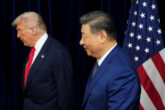February 12, 2018
Frustrations at the White House and the Pentagon
In early February, months-long tensions between the White House and the Pentagon over how to address North Korea spilled out into the public scene. As officials revealed to the New York Times, National Security Adviser H. R. McMaster had demanded that the Pentagon provide a menu of detailed military plans, including a “bloody nose” strike against North Korean nuclear facilities, in order to bring credibility to President Donald Trump’s threats. But the Pentagon, these officials noted, appeared reluctant to deliver on the request, seemingly worried that the White House lacked an appreciation of how quickly a military strike could escalate.
The reality is more nuanced. The Pentagon’s apparent refusal to deliver the White House’s desired military plans most likely derived from a number of factors unrelated to the Department of Defense’s feelings about the president or his foreign policy. In this case, the parameters likely set by the White House—low risk to U.S. forces, low risk to South Korea, low risk in provoking a North Korean response, but high damage to Pyongyang’s nuclear program or broader conventional force—may have simply been untenable. There is, after all, no effective surgical strike option for North Korea, no “bloody nose” that could reliably inflict determinative damage on military facilities without prompting devastating retaliation. The Pentagon always works more slowly than desired in the development of military plans, but ultimately cannot deliver on an impossible request—and is likely disinclined to offer less robust options.
Read the full article in Foreign Affairs.
More from CNAS
-
Chinese Maker of Bitcoin-Mining Machines Is a Security Threat, Says Expert
Bloomberg News reports that a Chinese manufacturer, Bitmain Technologies Ltd, that sells most of the world’s Bitcoin-mining machines — including 16,000 of them to a venture ba...
By David Feith
-
Indo-Pacific Security / Energy, Economics & Security
North Korea’s Provocations, Power Plays, and Shifting AlliancesTensions on the Korean Peninsula have reached a new and dangerous threshold. President Lee Jae Myung is warning of a real risk of accidental military clashes, as the situation...
By Dr. Go Myong-Hyun
-
Indo-Pacific Security / Energy, Economics & Security
How to Win the Economic War with ChinaTrump's approach to China has run aground, giving Beijing unprecedented advantage in the economic conflict....
By Edward Fishman & Julian Gewirtz
-
Indo-Pacific Security / Technology & National Security
Sharper: Tech + ChinaRecent talks between President Donald Trump and Chinese Communist Party General Secretary Xi Jinping placed a spotlight on emerging technologies, from high-end chips to minera...
By Charles Horn & Sevi Silvia




